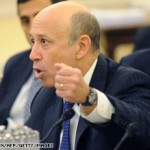This post has been read 2046 times!
Op-Ed February 5, 2010
Unemployment and job creation via small business assistance is now the Obama administration’s top priority in the public arena and has been a concern for more than a year. Realizing this last November, the CEO of Goldman Sachs, Lloyd Blankfein, chose small business support as the topic for a public relations move to counter the populace outrage over bankers being focused mostly on Goldman Sachs and AIG. He issued a statement that some in the press called a mea culpa, and paired it with a $500 Million gesture to the community called the “10,000 Small Business Initiative”. The plan was to give $300 Million in aid to small business as loans or grants, and $200 Million was to go to educational centers to help teach about “Business and Management Education”. 
Whatever became of the “10,000 small business initiative”? Being located near both the old and new Goldman Sachs headquarters, BatteryPark.TV (BPTV) decided to investigate. Were the funds distributed properly, or at all? Have any small businesses received loans to date?
The Goldman Sachs press release did not provide details on how to apply for the assistance. Last year, press officers explained to BPTV that details would be provided in January of 2010. This week, the same press person directed us to a third-party administrator, or Community Development Financial Institution (CDFI), handling the program in the New York area: Seedco.
A BusinessWeek article explains the CDFI process and the Goldman/Seedco relationship. Essentially, once the Wall Street banks were forced to convert to bank holding companies in 2008 as a condition of the TARP funding, these Wall Street entities outsourced the lowly commercial lending operations to CDFI’s. Federal regulations of commercial banks require certain percentages of loans to be made to low-income or minority communities. Seedco serves this need by targeting areas in New York City such as Harlem. Of note, BPTV was unable to confirm the facts represented in the BusinessWeek article as Seedco and others did not reply to many of our questions.
On February 1, BPTV made several calls to Seedco using the phone numbers listed for their offices on the Seedco website. No one answered the phones or replied to our messages until Goldman Sachs was informed of the problem. On February 3, a person representing himself as a “Senior lender” for the division of Seedco that awards small business loans finally called BPTV.
BPTV discussed with the lender small business scenarios that Seedco might find acceptable for issuing a loan. An example was used of a business with more than $100,000 in revenue, 80% profit margin, no collateral, three years in business, and requesting a $50,000 or greater loan. These would be typical, if not exceptional, characteristics of a low-income district small business. The lender said that no loan would be given in such a situation and that it was more a case of “equity” like a venture capital arrangement. When asked how Seedco differed from a regular commercial bank that would also not lend to small businesses, he declined to answer. Moreover, the lender seemed only interested in business locations in low-income areas of NYC.
BPTV asked the Seedco lending official about the status of the “10,000 small business initiative”. He explained that Goldman Sachs has so far delivered only $20 Million to Seedco for lending to small business, consistent with the BusinessWeek article. When asked whether any loans had been awarded to date, he declined to answer and discontinued the call.
A Goldman Sachs representative confirmed that Seedco is the one and only CDFI administering the $500 Million pledged for the “10,000 small business initiative”, so far. Therefore, only $20 Million has been allocated, at most, and it is nearly three months since Goldman Sachs issued the press release on November 17, 2009.
The impact of the “10,000 small business initiative” to New York City seems nonexistent. As mentioned above, neither Seedco nor Goldman Sachs would confirm that a single loan or grant has been issued to a small business. To find answers, BPTV asked various local officials who might know about Seedco, ranging from a former Mayor of NYC, representatives from Community Board 1, Manhattan Borough President, and the Battery Park City Authority, and none of them had heard of the name Seedco, much less knew of any assistance provided to small business. The local Better Business Bureau has no file on Seedco.
It is fair to say that the Goldman Sachs small business assistance plan is not working yet. Are the smartest bankers in the world suddenly inept and unable to administer a relatively small $500 Million financing program, or is this engineered incompetence meant to delay the parting of cash that would otherwise be a few banker’s bonuses? Who are the people overseeing this grand charitable plan?
The Advisory Council of the Goldman Sachs “10,000 small business initiative” consists of some of the most respected and successful business leaders in the world, including (from the press release):
- Lloyd C. Blankfein Co-Chair
- Warren Buffet: Co-Chair
- Dr. Michael Porter of Harvard Business School
- George Boggs, President and CEO, American Association of Community Colleges
- Dan Danner, President and CEO, National Federation of Independent Business
- Glenn Hubbard, Dean, Columbia Business School
- Robert Litan, Vice President for Research and Policy, Kauffman Foundation and Senior Fellow in Economic Studies at the Brookings Institution
- Marc H. Morial, President and CEO, National Urban League
- Javier Palomarez, President and CEO, United States Hispanic Chamber of Commerce
- Hilary Pennington of the Gates Foundation
- Thomas S. Robertson, Dean, The Wharton School of the University of Pennsylvania
- Leonard Schlesinger, President, Babson College
- Ellen Seidman, Vice President, ShoreBank Corp.
- David J. Skorton, President, Cornell University
- Margaret Spellings, Former Secretary of Education
- Thomas Tierney, Chairman and Co-Founder, The Bridgespan Group
Mr. Buffet is a significant investor of Goldman Sachs. Full disclosures of the other advisors are unknown. None of the members of the Advisory Council contacted would comment as to the level of detail to which they are involved, however we suspect that they are mostly figureheads and not involved in a detailed manner.
To be optimistic, the Goldman Sachs plan to help small businesses is in the early stages and can still be put back on track if the Advisory Council is made aware, which is the main purpose of this Op-Ed. Most of the cash is yet to be allocated.
With job creation and small business assistance priority number one to the country now, can the brightest minds in business get this simple task right? Or, will crony capitalism and puppet board members rule the day and allow Goldman Sachs to issue a $500 Million promise to small business and not deliver? Stay tuned.
